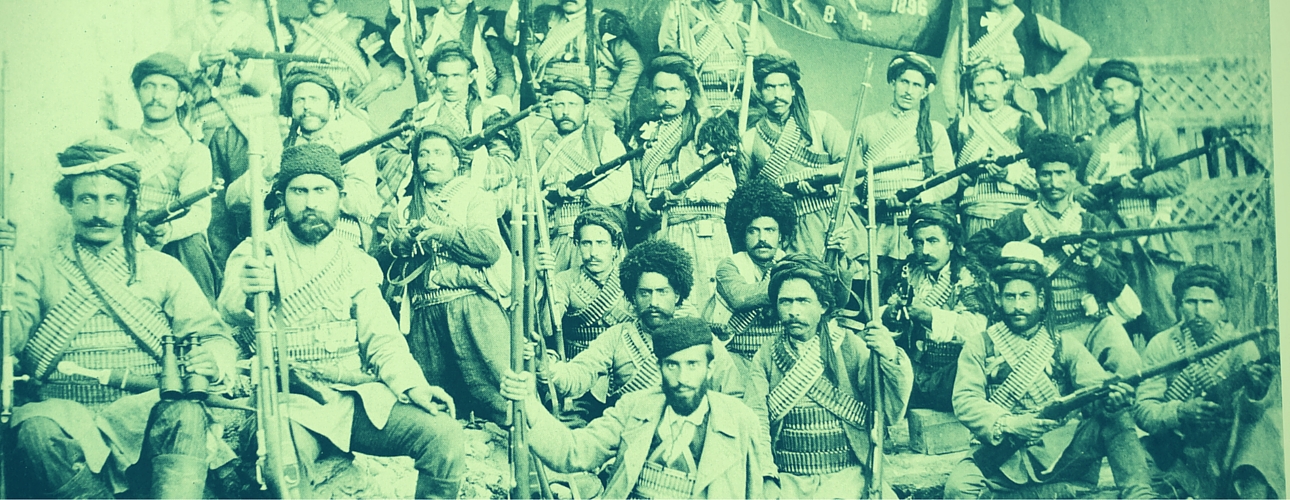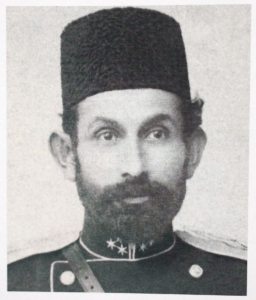
Nikol Douman [1867–1914]

Born in Ghshlagh, in Karabagh, Douman received his education at the diocesan school of Shoushi.
From 1891 to 1894, he pursued organizational activities and taught in the Armenian schools of Tabriz and Salmast.
From 1894 onward, he moved between Salmast and Vaspourakan, engaging Turkish troops and Kurdish armed bands in battles that have remained famous, including those of Derik, Sara, and Boghaz-Kyasan, after which the Kurds conferred upon him the nickname “Douman” (storm).
Both a fighter and a strategist, Nikol Douman was one of the principal organizers of the Expedition of Khanasor in 1897.
He then settled in Baku, where he was mainly involved in training young Dashnaktsakans in underground and military activities.
In 1904 he tried in vain to reach the insurgents of Sasoun to reinforce their ranks, but his armed band was dispersed after violent border clashes.
During the fighting between Armenians and Tatars (Azeris) in 1905, Nikol Douman was appointed commander-in-chief of operations in Yerevan province and the Ararat Plain.
In 1907, he wrote the manual Nakhagitz Zhoghovrdakan Inknapashtpanoutian (Outline for Popular Self-Defense).
Then, as the commanding officer of a group of 100 men, he successfully secured the defense of Tabriz during the Persian Constitutional Revolution. In 1910, he took part in the International Socialist Congress held in Copenhagen.
In September 1914, his health hopelessly deteriorating, and unable to join his comrades in battle, Nikol Douman took his own life. He was 47 years old.
Life plays strange games. One of those games is the reason for the necessity of this “manual” [the Outline for Popular Self-Defense].
Immediately after the Armenian-Turkish [Azeri] clashes in the Caucasus, my comrades proposed that I prepare this self-defense manual.
I was uncertain…
I was uncertain because I knew that this booklet would contain bloody lessons.
Blood is not odd for me, nor is it alien.
But I perfectly understand and completely sympathize only when that blood flows from the veins of governments that torment the people.
But here, in this manual?
A brother is taught to dip his hands into the blood of his brother, neighbor to stand against neighbor, one nation to clash with another…
That is why I was uncertain. But, in the end, implacable reality won.
In Turkey, there are muted whispers that forebode terrifying reactionary developments. In Persia, there are frequent clashes between the opposing currents of autocracy and constitutionalism. And in Russia, who knows what surprises are being prepared?
Uncertainty is now a crime. Every person who perceives the seriousness of the situation must speak, must encourage the [abovementioned] three segments of the Armenian people to prepare for self-defense.
And, fatefully, they must prepare.
But…
But I would feel spiritually consoled and morally rewarded if one yearned-for day… all those military preparations were aimed at the monstrous foreheads of those treacherous governments and sanctioned parasites that, by poisoning nations, have placed us before the dark necessity of composing fratricidal lessons.
From the Epilogue of Outline for Popular Self-Defense, 1907


